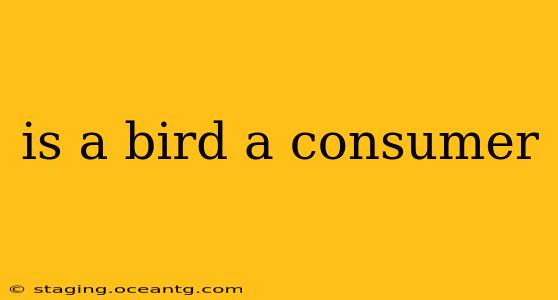Birds, with their vibrant plumage and melodic songs, are captivating creatures. But beyond their aesthetic appeal lies a crucial role within the intricate web of life: they are consumers. This seemingly simple statement opens a door to a fascinating exploration of avian ecology and their impact on the environment. This post will delve into why birds are consumers, exploring their various dietary habits and the broader implications for ecosystems.
What Does it Mean to Be a Consumer in Ecology?
In ecological terms, a consumer is an organism that obtains energy by feeding on other organisms. This differs from producers (like plants, which create their own energy through photosynthesis) and decomposers (like fungi and bacteria, which break down dead organic matter). Birds, occupying a variety of niches, perfectly exemplify this consumer role.
What Types of Consumers Are Birds?
Birds exhibit remarkable dietary diversity, showcasing different consumer strategies:
-
Herbivores: Many birds are primarily herbivores, consuming seeds, fruits, nectar, and leaves. Think of finches cracking seeds, parrots feasting on fruit, or hummingbirds sipping nectar. These birds play a significant role in seed dispersal and pollination.
-
Carnivores: Predatory birds like eagles, hawks, and owls are apex carnivores, preying on smaller animals like rodents, fish, and other birds. These birds help regulate prey populations and maintain ecological balance.
-
Omnivores: A substantial number of bird species are omnivores, consuming both plants and animals. Robins, for example, readily eat insects and berries, showcasing adaptability in their diet. This flexibility allows them to thrive in diverse habitats.
-
Insectivores: Many songbirds are insectivores, playing a critical role in controlling insect populations. Their consumption of insects prevents outbreaks that could damage crops or forests. Swifts, for example, are aerial insectivores, catching insects on the wing.
-
Scavengers: Some birds, like vultures, are scavengers, feeding on carrion (dead animals). They play a vital role in cleaning up carcasses, preventing the spread of disease.
How Do Birds' Dietary Habits Impact Ecosystems?
The diverse feeding habits of birds have significant consequences for ecosystems:
-
Seed dispersal: Birds that consume fruits and seeds help disperse plant species, contributing to the biodiversity and regeneration of forests and other habitats.
-
Pollination: Birds, particularly hummingbirds, are vital pollinators for many plant species, facilitating reproduction and maintaining plant populations.
-
Pest control: Insectivorous birds significantly reduce insect populations, benefiting agriculture and forestry by limiting crop damage and preventing outbreaks.
-
Nutrient cycling: Birds' waste products contribute to nutrient cycling, enriching the soil and supporting plant growth.
-
Population regulation: Predatory birds help maintain the balance of prey populations, preventing overgrazing or other ecological imbalances.
Are There Any Birds That Aren't Consumers?
No, all birds are consumers. Their metabolic needs require them to obtain energy by feeding on other organisms. While their specific dietary strategies vary widely, their fundamental role in the food web remains consistent.
What are some examples of birds and what they eat?
Here are a few examples:
- Bald Eagle: Primarily a carnivore, consuming fish, birds, and small mammals.
- Hummingbird: A nectarivore, feeding primarily on nectar from flowers.
- Robin: An omnivore, consuming insects, worms, berries, and seeds.
- Woodpecker: An insectivore, feeding on insects found in trees.
- Turkey Vulture: A scavenger, consuming carrion.
In conclusion, birds are unequivocally consumers, playing diverse and vital roles within various ecosystems. Their dietary habits significantly influence the distribution and abundance of plant and animal species, highlighting their ecological importance. Understanding the consumer role of birds is crucial for appreciating the intricate workings of the natural world and the need for conservation efforts.
